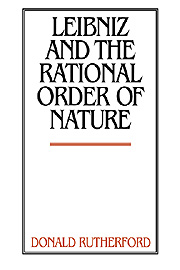Conclusion
Published online by Cambridge University Press: 05 June 2012
Summary
The details of Leibniz's metaphysics are sufficiently difficult, and in many cases sufficiently obscure, that it is easy to lose track of the central thread of his thought – the basic idea that motivates his metaphysical inquiries and justifies us in regarding them as offering answers to some of philosophy's deepest perennial concerns. For this we must see Leibniz's metaphysics as an intellectual project guided by a moral vision. As I have tried to suggest, the primary importance of metaphysics for him is that it embodies our efforts to discern a rational order in the created world, thereby strengthening our conviction about the operation of divine wisdom. Reason gives us the power to overcome the limited perspective of our senses, to comprehend (so far as it is humanly possible) the world as it is in itself, and thus to appreciate the perfection that justifies our belief in this as the best of all possible worlds.
The force of Leibniz's moral vision is nowhere better expressed than in a brief allegory, entitled by one of his later editors “Leibniz's Philosophical Dream.” The story opens with the narrator (we may call him “Leibniz”) deeply troubled by the human condition: “the hardships to which we are subjected, the shortness of our life, the vanity of glory, the improprieties that are born of sensual pleasure, the illnesses that overwhelm even our spirit; finally, the annihilation of all our greatness and all our perfections in the moment of death.”
- Type
- Chapter
- Information
- Leibniz and the Rational Order of Nature , pp. 289 - 290Publisher: Cambridge University PressPrint publication year: 1995



